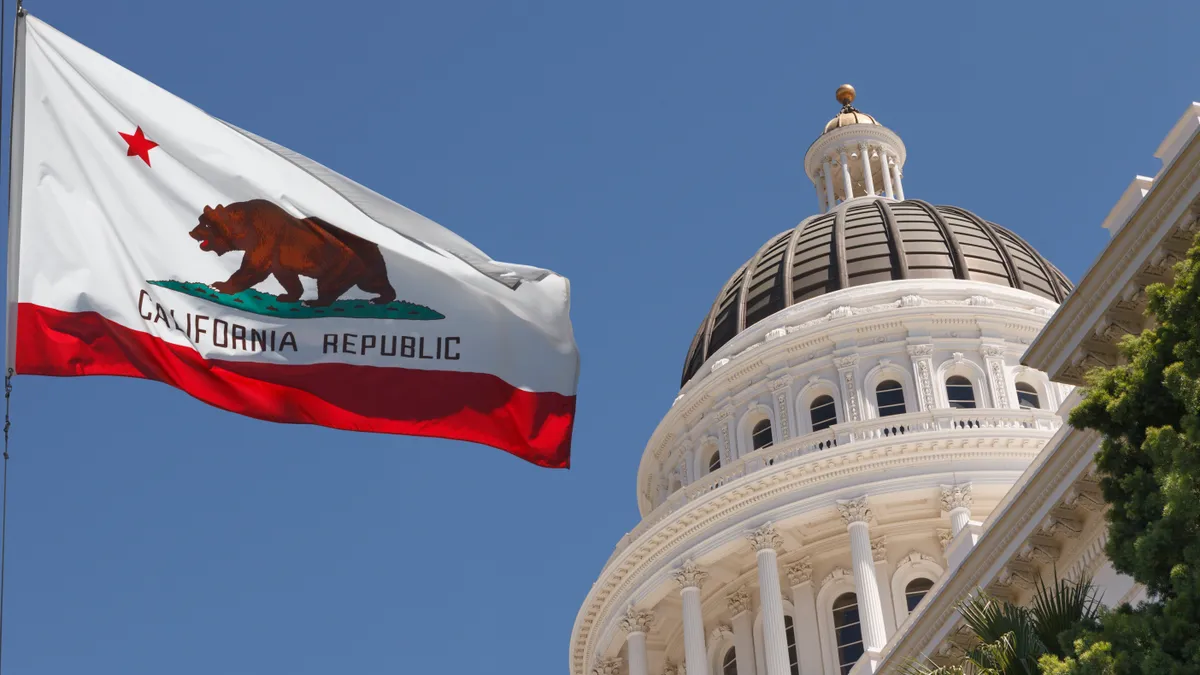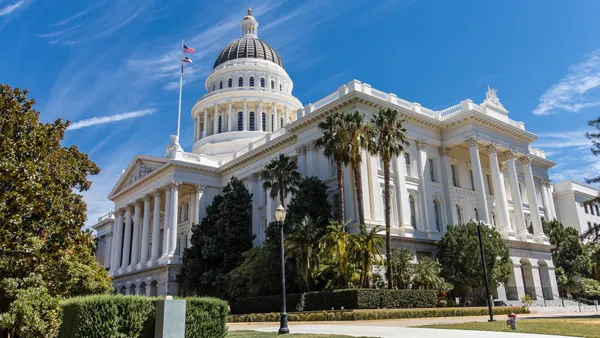Dive Brief:
- The California Air Resources Board, the agency tasked with enforcing the state’s climate disclosure rules, published guidance Wednesday on how companies can comply with Senate Bills 253 and 261 and when they are required to submit initial reports.
- The agency outlined its process for transitioning the climate disclosure legislation into a final regulation and shared what steps it has taken so far, which include the initial rulemaking, issuing an enforcement notice, as well as receiving public input. CARB said it is currently in the “informal, information-gathering stage” for implementing both laws and aims to develop a regulation by the end of the year.
- CARB also provided new information on how companies should report under SB 261, the Climate-related Financial Risk Act. The agency said it will post a public docket on Dec. 1 for entities covered by the bill — companies operating in California with annual revenues over $500 million — so they can post a public link to their first climate-related financial risk report. Covered entities are expected to submit their reports by Jan. 1, 2026.
Dive Insight:
CARB said the public docket for submitting reports for SB 261 compliance will remain open until July 1, 2026. The state agency said this will boost transparency and allow the public to conveniently view all climate risk reports in one location.
A 2023 California Senate floor analysis found that SB 261, which focuses on climate-related financial risks posed by companies’ operations, is expected to impact more than 10,000 companies operating in California.
Though the agency provided further guidance on SB 261, it reiterated that reports under SB 253 or the Climate Corporate Data Accountability Act will be due in 2026 but did not provide a specific due date. This law requires business entities operating in California with annual revenues exceeding $1 billion to report their greenhouse emissions each year.
CARB noted in its July 9 FAQ document that the “timeline for emissions disclosure and verification will be determined through additional public consultation and through the rulemaking process.”
Entities covered by SB 253 are expected to publicly disclose their scope 1 and 2 emissions to a reporting organization in 2026, and scope 3 emissions beginning 2027. The legislation is estimated to impact over 5,300 companies operating in California, according to environmental nonprofit Ceres.
Last year, CARB published an Enforcement Notice that stated the agency would “not take enforcement action” on entities subject to SB 253 for incomplete reporting during the first reporting cycle due 2026, given they “make a good faith effort to retain all data relevant to emissions reporting for the entity’s prior fiscal year.”
In the December 2024 notice, CARB said companies required to comply with SB 253 could submit scope 1 and scope 2 greenhouse gas emissions data for 2026 — the earliest reporting deadline under the bill — based on information they “already possessed or [are] collecting at the time this Notice was issued.”
The agency said at the time that the enforcement discretion would help companies work towards full compliance, since emissions data collection and disclosure is a new task for some companies that may require some preparation time.
SB 261 was not affected by the agency’s enforcement notice.
The enforcement notice came shortly after California Gov. Gavin Newsom signed Senate Bill 219 into law in September 2024, which included a series of amendments to SB 253 and SB 261.
“CARB is taking a flexible approach to mandated reporting, prioritizing reasonable efforts for first-time reporters,” Alyssa Zucker, senior industry principal at Workiva’s carbon solutions platform, said in an email to ESG Dive Friday. “This is likely to de-risk opposition to the rules, providing a practical on-ramp for companies to develop the programs and infrastructure required to meet requirements.”
The agency noted in its FAQ document this week that as part of its regulation development process, it will also determine, and seek stakeholder input on, the definition of “doing business in California” as it relates to the California Corporate Greenhouse Gas Reporting Program. CARB also said it will seek stakeholder input on whether the agency should consider exemptions for certain circumstances, such as cases where a company exceeds the revenue thresholds described in the disclosure laws, but the majority of its business is based outside of California.












